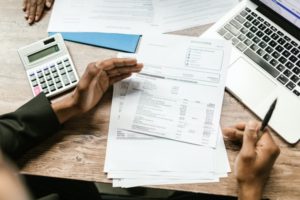The financial impact of COVID-19 slowed global economies, forcing everyone to reconsider their financial priorities, especially when it comes to debt and credit. This pushed consumers to dip into their emergency savings or resort to credit cards due to the widespread unemployment and salary cuts, dramatically increasing household debts, including credit card debt, across the country.

Dealing with debt is never a pleasant experience, but the backdrop of a global pandemic may seem to tip the scales in your favor.
Don’t give up hope if you’ve found yourself in a tight place as a result of the COVID-19 crisis, like so many other Americans. In reality, after the pandemic, now is the time to take steps, even in difficult circumstances, to effectively and proactively manage debt and credit. It will give you a better long-term financial picture and a stronger position when things are improving. You can participate in a formal debt management program through a nonprofit credit counseling agency, or you can create your own debt repayment strategy!
Here are the options that may help you manage debt and credit in the post-COVID world:
Get help with unsecured debts first
In some ways, we see the situation improving. Businesses are reopening and employees are going back to the offices for in-person work. But, many people are still suffering from unemployment and reduced income. For these consumers, credit card companies, such as Capital One, Chase, Citi, U.S. Bank, and Wells Fargo have issued statements on their websites promising various types of aid. They’ve offered help such as credit line increment, collection forbearance, and skipped payments. Lenders are providing payment extensions and other opportunities to customers who can’t make their car payments.
If you’re struggling to make payments on a personal loan or a small business loan, different banks, credit unions, and other financial institutions are giving loan extensions and deferred payment options.
If you need cash, many lenders and the US Small Business Administration (SBA) are offering loans to coronavirus victims.
Avoid scams
Scammers try to take advantage of people who are in a difficult financial situation. COVID-19 is no different. But how can you identify these scams?
It’s almost certainly a scam if you find the program or service “too good to be true.”
You should understand what type of service the company is giving you:
- Credit counseling
- A consolidation loan
- Debt settlement
Stay away from any for-profit debt relief or settlement company that:
- Asks for a fee or any sort of charges before they settle your debts. Unless it’s a non-profit credit counseling program, upfront payments are a huge red flag for debt relief programs.
- Claims to provide help in taking advantage of “new government schemes.”
- Makes assurances they will settle your debt for less than what you owe
- Does not inform you of the consequences of enrolling in the program.
- Asks for your personal financial information without providing free information on their services
Also, be aware of “bait and switch” sales tactics, such as a “loan program” that needs you to first join in a credit repair or debt settlement program.
Reconnect with your lenders
Several banks and lenders developed COVID-related relief plans to help borrowers financially devastated by the pandemic. They offered deferred payments, no late penalties, and guaranteed that short-term solutions would not be reported to credit bureaus.
Most of the relief programs, however, only lasted a few months. As things are getting back to normal slowly, check in with your lenders and creditors to make sure you’re on the right track.
Do you continue your payments on the same schedule as before the pandemic? Did you pay interest on the money you are paying later?
Make sure you understand what’s going on with your debt and credit in the long run, and don’t expect everything will be “business as usual” after the pandemic.
Check your credit report
It’s recommended to check your credit report once a year. This is especially crucial post-pandemic. If you’ve had financial difficulties that have resulted in missed payments or increased debt, you want to know how your credit has been impacted. You also need to make sure that all the information is correct, and that there are no signs of identity theft on your credit report. Using annualcreditreport.com, you can request a copy of your credit report from each of the three credit bureaus. Everyone is entitled to a free copy of their credit report from each bureau once a year. So avoid any company charging a fee for access to your credit information.
Double-check that your report accurately reflects your financial situation.
For example, if you negotiated with your creditor for a lower payment or a deferred payment plan, make sure your credit report doesn’t show that you were late or behind on payments.
Similarly, if you were current on your mortgage payments before requesting forbearance during the COVID crisis, your report should state that you were not behind on your payments prior to the forbearance.
Develop a credit repair strategy
You’re not alone if you piled up a lot of debt or skipped payments during the economic crisis resulting from the pandemic. However, now that the situation is improving, the sooner you take steps to improve your credit score, the better.
Create a debt-payoff strategy, starting with any accounts that are past due. Make on-time payments on any accounts that require immediate attention to stay current and avoid fines or further damage to your credit score. When your accounts are up to date, look at your credit utilization ratio, and check how much of your available credit you’re utilizing.
People should keep their debt to less than 30% of their available credit, according to FICO. If your credit card has a 10,000 limit, for example, you should attempt to keep your debt below $3,000. This applies to both your credit card debt and your overall debt.
Paying down your debt will help you improve your credit score. The credit bureaus recommend you should not cancel unused credit cards at this time because they’ll assist you in maintaining a high level of available credit while you pay down your debt.
Finally, come up with an effective strategy for reducing your debt. Prioritize paying off debt with the highest interest rate first, or, if possible, try consolidating your debt onto a lower-interest card.
If you find that you are having trouble coming up with a debt repayment strategy on your own, you may want to contact a nonprofit credit counseling agency. A certified credit counselor will help you determine the best option moving forward, which may include enrolling in a debt management plan.
Make a budget for the post-COVID situation
After the pandemic, everyday life is getting restored slowly. You can look forward to a brighter financial future once you start going back to the office or your company is able to re-opening its business.
However, make sure you prepare a budget that accounts for any recent changes in daily household costs and monthly income post-COVID.
Analyze your monthly spending, make a budget, and cut back on your expenses to help your debt repayment strategy. Also, you can redirect the money you would have spent on entertainment or travel to debt repayment or savings.
Creating an emergency savings cushion, if possible, can also keep you from having to rely on high-interest borrowing in the future if you face another financial hardship. Most financial experts recommend saving three to six months’ worth of spending in a high-interest savings account.
Tara Falcone, Chartered Financial Analyst (CFA), CFP, and Founder of ReisUP LLC, suggested, “This pandemic has highlighted the need for all of us to be a lot more proactive when it comes to protecting our financial health. Both while we’re alive and in the event of our, or one of our family members’ unexpected passing. To protect your finances from unexpected events like lockdowns and job loss, you need to prioritize building an adequate emergency fund.”
Finally, keep an eye on your credit during the recovery process. To ensure that the information in your credit report remains accurate, you can sign up for a credit monitoring service.
Prepare strategies to control spending
There are several ways to help you keep track of your spending. Here are a few important ones to pay attention to:
- Avoid impulses – Try not to compare yourself to others, especially on social media, since this can lead to overspending due to a fear of missing out.
- Shop locally – Shopping locally and in person can help you be more aware of your spending, especially if you set a budget ahead of time.
- Think and buy – Before going shopping, consider giving yourself one or two days to think about items you truly desire.
- Invest your money – You’ll miss out on some short-term pleasure, but you’ll reap significant long-term benefits. Overspending due to impulse buying can be fatal for your finances and your monthly budget.
- Stick to your budget – In the end, sticking to your budget will enable you to determine where and when you should spend your money.
Zuzana Brochu, CFP, Certified Business Exit Consultant (CBEC) and vice president of financial planning strategy at People’s United Advisors explained, “There is a two-fold answer to this question because, generally speaking, people fall into one of two categories at this point in the pandemic: those with negative cash flows as compared to a year ago, and those with positive cash flows.”
“For many, the pandemic has meant furloughs, job losses, and associated economic hardship. For this group, the most important thing to do is take stock of where they are financially, particularly from a cash flow standpoint. If their income continues to be negatively impacted, addressing their budget needs to be a priority. I realize that is not a popular thing to say, but this is a time to eliminate as much discretionary spending as possible.”
Consult an attorney
In some cases, you may want to seek legal assistance. For instance, you may require the services of an attorney if:
- A creditor has filed a lawsuit against you.
- You have assets you want to safeguard.
- If you rely on Social Security or another form of government assistance. An attorney may protect you from debt collection.
You can find an experienced attorney in a variety of ways. It’s a good idea to check with the state bar organization before hiring an attorney to be sure he or she is in good standing.
You can check if the attorney has a disciplinary record by searching his or her name on the state bar website, where the attorney is licensed, or by contacting the state bar association.
Some attorneys provide free or discounted services. If you meet specific criteria, there may be legal aid offices or legal clinics in your area that will provide services for free.
Author Bio:
Lyle Solomon has considerable litigation experience as well as substantial hands-on knowledge and expertise in legal analysis and writing. Since 2003, he has been a member of the State Bar of California. In 1998, he graduated from the University of the Pacific’s McGeorge School of Law in Sacramento, California, and now serves as a principal attorney for the Oak View Law Group in California.
If you’re struggling to pay off debt, ACCC can help. Schedule a free credit counseling session with us today.





